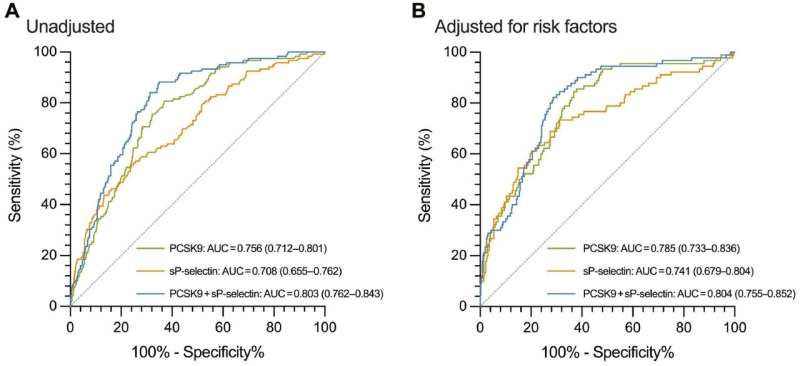This article has been reviewed according to Science X's editorial process and policies. Editors have highlighted the following attributes while ensuring the content's credibility:
fact-checked
proofread
Clinical significance of PCSK9 and soluble P-selectin in predicting major adverse cardiovascular events

Researchers have studied the association of proprotein convertase subtilisin/kexin type 9 (PCSK9) with soluble P-selectin (sP-selectin) and their values in predicting major adverse cardiovascular events (MACE) at one-year follow-up in patients with acute coronary syndrome (ACS) receiving dual antiplatelet therapy after primary percutaneous coronary intervention (PCI).
The study is published in Cardiovascular Innovations and Applications.
A total of 563 patients with ACS who underwent primary PCI were prospectively recruited from March 2020 to June 2021. The baseline levels of PCSK9, sP-selectin, and other platelet reactivity biomarkers were determined using enzyme-linked immunosorbent assays.
sP-selectin and ox-LDL levels significantly increased with increasing PCSK9 tertiles. High sP-selectin was associated with high PCSK9 levels, and PCSK9 was positively correlated with sP-selectin.
Patients with both PCSK9 >17.4 ng/mL and sP-selectin >7.2 ng/mL had a significantly higher incidence of MACE than patients with lower levels. Multivariate analysis indicated that high sP-selectin and PCSK9 levels were independent risk factors for MACE, and the combination of PCSK9 and sP-selectin had better predictive value than each biomarker alone.
PCSK9 and sP-selectin may be potential predictive biomarkers for one-year prognosis in patients with ACS after primary PCI.
More information: Yao Yao et al, Clinical Significance of PCSK9 and Soluble P-selectin in Predicting Major Adverse Cardiovascular Events After Primary Percutaneous Coronary Intervention in Patients with Acute Coronary Syndrome, Cardiovascular Innovations and Applications (2024). DOI: 10.15212/CVIA.2023.0087

















